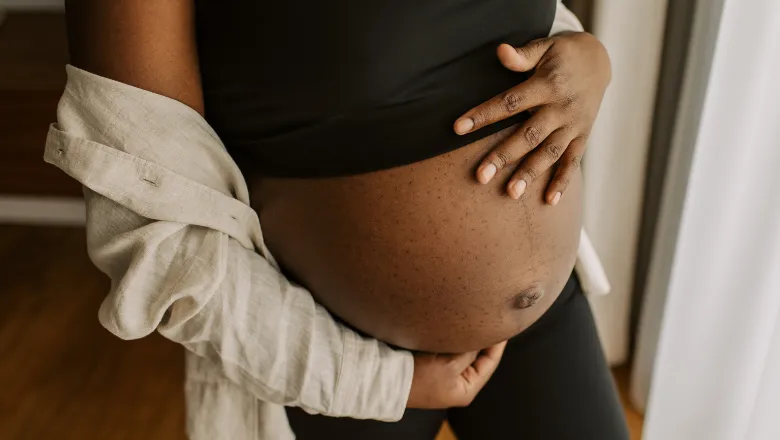The results of the WILL trial provide reassurance that planned early term birth for women with chronic or gestational hypertension at term is a good clinical pathway. Mothers benefit by less frequently developing pre-eclampsia, without any increase in Caesarean birth or health problems for their babies. The NHS benefits from reduced costs for ongoing monitoring.
Laura Magee, Professor of Women’s Health at King’s, and Chief Investigator on the study
28 November 2024
Study finds planned early term birth helps to avoid complications in women with high blood pressure
A study led by King’s College London has found that timing birth at 38 weeks of pregnancy in women with high blood pressure could help to avoid complications for mothers and babies.

At least ten per cent of pregnant women experience high blood pressure, which develops either before pregnancy (chronic hypertension) or during pregnancy (gestational hypertension or pre-eclampsia). Pre-eclampsia, which accounts for about one third of these high blood pressure cases, is the most dangerous form of high blood pressure in pregnancy and is associated with the greatest risk to mothers and their babies. For example, mothers with pre-eclampsia may develop problems such as bleeding, and babies may have slowed growth or need care in a neonatal unit after birth.
As these complications become more frequent as mothers approach their due dates (40 weeks of pregnancy), birth slightly earlier at term could help to reduce risks, as long as it doesn’t pose any additional risks to the baby.
To investigate the optimal time of birth in women with high blood pressure, the WILL trial (When to Induce Labour to Limit risk in pregnancy hypertension) recruited 403 women with chronic or gestational hypertension who were then offered either planned early term birth at 38 weeks of pregnancy (intervention group), or standard of care at term (control group).
The trial found that pre-eclampsia developed less frequently in the intervention group, and care for these women was less expensive. Otherwise, there was no difference between the intervention and control groups with respect to: poor maternal outcome (severely elevated blood pressure, maternal death or serious maternal illness), newborn baby care unit admission for four or more hours, or the need for Caesarean birth. The results were published this week in PLoS Medicine.
The findings suggest that planned early term birth at 38 weeks of pregnancy may be the best option for women with chronic or gestational hypertension, who are nearing ‘term’ gestation (from 37 weeks) and remain well.
The randomised trial was coordinated by the Birmingham Clinical Trials Unit, and performed in collaboration with 50 consultant-led maternity units in the UK. The top four recruiting centres were St Mary's Maternity Unit (Poole), Leicester Royal Infirmary, Croydon University Hospital, and St Mary's Manchester. The trial was funded by the NIHR.
Organisations working in partnership with King's on the WILL trial include the University of Southampton, Action on Pre-eclampsia, The University of British Columbia, The University of Adelaide, the University of Nottingham and The Stillbirth and Neonatal Death Charity.
Read the full paper in PLoS Medicine.

